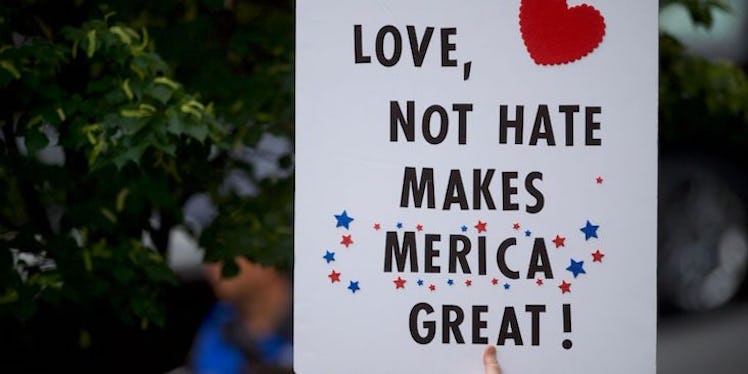
Our Generation Is Apparently Way Less Racist Than Older People, So There's Hope
In today's world, where everyone carries a computer in their pocket and media coverage is 24/7, we're inundated with news of tragedy and despair.
This makes it pretty easy to feel as if humanity is trending downward.
But if you take a step back and look at the bigger picture, it's actually a pretty good time to be alive.
War occurs less frequently and is less deadly, we've made great strides in combatting disease, and extreme poverty has also declined exponentially over the past few decades.
On top of this, data suggests younger people are becoming increasingly less racist, according to Charles Kenny, a senior fellow at the Center for Global Development.
In other words, young folk are far more tolerant than older generations, and this trend seems poised to continue.
This is a sensitive topic, and one that should not be approached lightly.
In saying the world is becoming more tolerant, we cannot ignore the ways racism and oppression persist, including in America.
But let's examine the data presented by Kenny, as well as other research, and see what conclusions can be drawn.
Today, people are far more welcoming to the notion of diverse neighborhoods.
Back in 1960, nearly half of all Americans said they would move if a black family moved in next door.
By 1980, the World Values Survey showed just 8 percent of Americans felt the same way.
Today, only 6 percent of Americans hold such an intolerant viewpoint.
This trend is also reflected in other countries.
The World Values Survey has data on how people in 29 countries would feel about living next to someone of a different race (roughly 60 percent of the world's countries).
As Kenny notes, "progress is far from universal," as 12 countries (seven of them in Europe) have seen an increase in racism in this regard.
But, overall, 16 countries saw a decline in racism based on this measure and, overall, the data shows approximately 23 percent of the world would have reported being uncomfortable living next to someone of a different race in the early 2000s compared to 17 percent in the early 2010s.
Views on interracial marriage have also changed dramatically in the past half century or so.
Gallup polling shows just 4 percent of Americans approved of interracial marriage in 1958.
By 2013, the number of Americans approving of marriage between a white and black person rose to 87 percent.
The change in attitudes toward the issue of interracial marriage also appears to have had a behavioral impact over the years.
In 2010, about 15 percent of all new marriages in the United States were between spouses of a different race or ethnicity, over double the share of new marriages in 1980 (6.7 percent), according to Pew Research Center.
Far more Americans would vote for a black president than several decades ago.
In 1958, according to Gallup, just 38 percent of Americans said they would vote for a black presidential candidate.
By 2012, that number was up to 96 percent.
Racially motivated hate crimes in the US have declined over the past 20 years or so.
In 1996, the FBI reported there were 6,336 racially or ethnically motivated hate crimes in the US.
By 2015, that number dropped to 3,310.
But that same year, a white supremacist shot and killed nine black people in a historically black church in Charleston, South Carolina.
Moreover, after Obama's election in 2008, there was an uptick in hate crimes against black people.
In the long-term, we've seen a downward trend in racially or ethnically motivated hate crime, but there have also been unsettling and violent signs that racism is alive and well in the US.
Discriminatory policies have declined overall worldwide.
Political scientists Victor Asal and Amy Pate studied laws affecting ethnic minorities in 124 countries between 1950 and 2003.
Ultimately, they found the proportion of countries with policies discriminating against ethnic minorities fell from 44 percent to 19 percent during that time period, which is a major decline.
Meanwhile, the proportion of countries with policies favoring minorities increased from 7 percent to 25 percent during the same time period.
Racism is still a major problem, especially in the US.
While we should certainly celebrate the fact the world is seemingly becoming more tolerant in certain ways, this does not mean discrimination and racism are close to being defeated.
Racism continues to be systemic in America, especially in relation to the criminal justice system and its disproportionate impact on people of color, which brings with it myriad socioeconomic problems.
Meanwhile, across Western society, we've seen white nationalism and xenophobia becoming more mainstream in recent years.
This was definitely evident in the election of Donald Trump, who ran on a vehemently anti-immigrant platform and was endorsed by the official newspaper of the Ku Klux Klan shortly before his victory.
There is also data that suggests white Millennials (white people born roughly between 1980 and 2000), are less racist or prejudiced than older generations, but by a very slim margin.
Beyond the US, ethnic divisions continue to be a central cause of violent conflict worldwide.
Long story short, there are many reasons to feel hopeful for the future in terms of the world becoming a more openminded, tolerant place, but we still have a lot of work to do.
Perhaps more than anything, what this conversation reveals it that progress does not come easily -- it's a slow and steady endeavor.
Citations: The data are in: Young people are increasingly less racist than old people (Quartz)